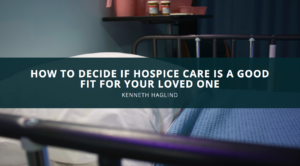Minnesota Hospice Expert Kenneth Norman Haglind Explains How To Decide If Hospice Care Is A Good Fit For Your Loved One


When you’re working to figure out how to handle the declining health of a loved one, emotions can run high. Minnesota hospice expert Kenneth Norman Haglind explains how to decide if it’s time to consider hospice care for your family member who is suffering from a terminal illness.
First, you’ll want to talk with their doctor and get their opinion. While the final decision is up to you, get an unbiased opinion from someone who is emotionally removed from the situation can go a long way in helping you figure out next steps, says Kenneth Haglind.
 Of course, the most important person in the decision is your loved one. Kenneth Norman Haglind recommends talking to them about how they feel about hospice care. Ken Haglind says that while this conversation may feel uncomfortable for you, take solace in the fact that your loved one has already mulled over the possibility of end of life care many times in their mind. If treatment is no longer working well, or they no longer want to pursue aggressive treatment options, Ken Haglind says that hospice care may be the next logical step. Your family member may even be relieved that you’re presenting them with the option, according to Kenneth Haglind. Many people who are dealing with terminal illness go through aggressive treatment at the insistence of family members, even though they may not want the treatment themselves.
Of course, the most important person in the decision is your loved one. Kenneth Norman Haglind recommends talking to them about how they feel about hospice care. Ken Haglind says that while this conversation may feel uncomfortable for you, take solace in the fact that your loved one has already mulled over the possibility of end of life care many times in their mind. If treatment is no longer working well, or they no longer want to pursue aggressive treatment options, Ken Haglind says that hospice care may be the next logical step. Your family member may even be relieved that you’re presenting them with the option, according to Kenneth Haglind. Many people who are dealing with terminal illness go through aggressive treatment at the insistence of family members, even though they may not want the treatment themselves.
If your loved one’s pain is getting harder and harder to manage, that’s another sign that it may be time to consider hospice care, according to Kenneth Haglind. Studies show that pain becomes more intense in the final stages of life. Talking to your loved one about making them as comfortable as possible through the progression of their disease can let them know that you’re making their comfort a top priority, even though the conversation may be emotionally difficult for you.
While your loved one is the top priority, Kenneth Norman Haglind also recommends taking stock of your own energy and stress levels. Being a full or part time caretaker of a loved one takes a toll not only on you – but on your family members as well. In order for you to be there for your loved one, you need to take care of yourself first. If you’re not able to manage your own stress levels while caring for your loved one, hospice may be the answer. Kenneth Haglind urges you to remember that this does not mean you’re giving up on your loved one – you can still be heavily involved in their care.
